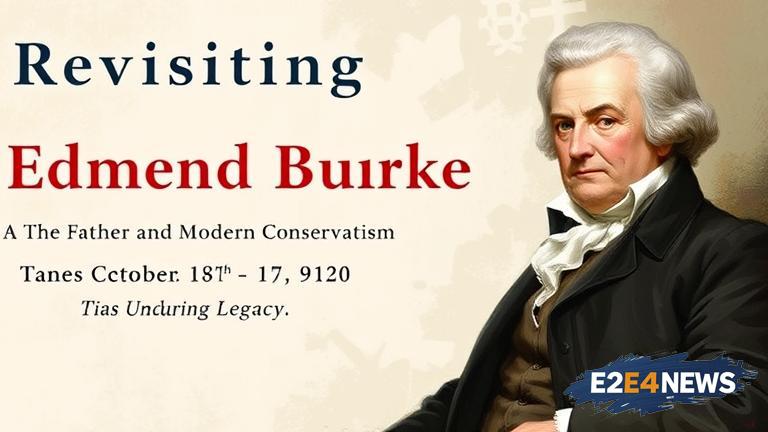Edmund Burke was a prominent Irish statesman, economist, and philosopher who played a significant role in shaping modern conservatism. Born in 1729 in Dublin, Ireland, Burke was educated at Trinity College and later moved to England to pursue a career in politics. He was elected to the House of Commons in 1765 and quickly gained recognition for his eloquent speeches and writings on politics, economics, and philosophy. Burke’s most notable work, ‘Reflections on the Revolution in France,’ published in 1790, is a scathing critique of the French Revolution and its ideals. He argued that the revolution’s emphasis on reason, individualism, and radical change would lead to chaos and tyranny. Instead, Burke advocated for a more gradual and organic approach to social and political reform, emphasizing the importance of tradition, morality, and individual rights. His ideas have had a lasting impact on liberal thought, influencing thinkers such as John Stuart Mill and Friedrich Hayek. Burke’s concept of ‘little platoons’ – small, local communities that provide social support and cohesion – remains a cornerstone of conservative philosophy. He also believed in the importance of private property, limited government, and individual freedom. Burke’s critique of the French Revolution’s abstract and universal principles has been seen as a precursor to modern conservative thought. His emphasis on the importance of historical context, cultural tradition, and social norms has influenced generations of politicians and thinkers. Despite his conservative leanings, Burke was a strong advocate for social justice and human rights, particularly in the context of colonialism and slavery. He was a vocal critic of the British East India Company’s abuses in India and advocated for the abolition of slavery. Burke’s legacy extends beyond politics, with his ideas on aesthetics, morality, and human nature continuing to influence fields such as literature, philosophy, and psychology. His concept of the ‘sublime’ – a aesthetic experience that evokes feelings of awe and wonder – has been particularly influential in the arts. Burke’s writings on morality and human nature have also had a lasting impact on ethical theory, with his emphasis on the importance of empathy, compassion, and social norms. In recent years, Burke’s ideas have experienced a resurgence in popularity, particularly among conservative thinkers and politicians. His critique of radical ideology and emphasis on tradition and social cohesion have been seen as a response to the challenges of globalization, immigration, and social change. However, Burke’s legacy is not without controversy, with some critics arguing that his ideas have been used to justify social inequality, imperialism, and reactionary politics. Nevertheless, Burke’s enduring influence on liberal thought and his continued relevance in modern debates make him a fascinating and important figure in the history of ideas. His ideas on tradition, morality, and individual rights continue to shape conservative philosophy, while his critique of radical ideology and emphasis on social cohesion remain essential reading for anyone interested in politics, philosophy, and social theory.
